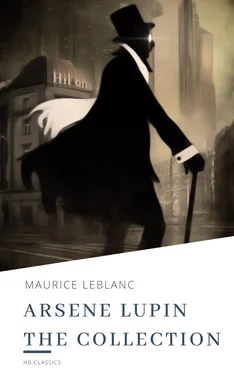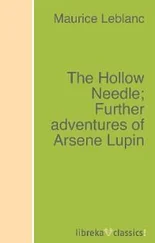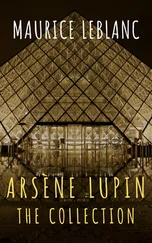While talking, the two men had crossed the ruins, turned toward the little door and were now walking beside the chapel. Beautrelet stopped:
"Do you really want to know, Monsieur le Juge d'Instruction?"
"Of course, I do."
Beautrelet was carrying a walking-stick, a strong, knotted stick. Suddenly, with a back stroke of this stick, he smashed one of the little statues that adorned the front of the chapel.
"Why, you're mad!" shouted M. Filleul, beside himself, rushing at the broken pieces of the statue. "You're mad! That old saint was an admirable bit of work—"
"An admirable bit of work!" echoed Isidore, giving a whirl which brought down the Virgin Mary.
M. Filleul took hold of him round the body:
"Young man, I won't allow you to commit—"
A wise man of the East came toppling to the ground, followed by a manger containing the Mother and Child… .
"If you stir another limb, I fire!"
The Comte de Gesvres had appeared upon the scene and was cocking his revolver. Beautrelet burst out laughing:
"That's right, Monsieur le Comte, blaze away!—Take a shot at them, as if you were at a fair!—Wait a bit—this chap carrying his head in his hands—"
St. John the Baptist fell, shattered to pieces.
"Oh!" shouted the count, pointing his revolver. "You young vandal!– Those masterpieces!"
"Sham, Monsieur le Comte!"
"What? What's that?" roared M. Filleul, wresting the Comte de Gesvres's weapon from him.
"Sham!" repeated Beautrelet. "Paper-pulp and plaster!"
"Oh, nonsense! It can't be true!"
"Hollow plaster, I tell you! Nothing at all!"
The count stooped and picked up a sliver of a statuette.
"Look at it, Monsieur le Comte, and see for yourself: it's plaster! Rusty, musty, mildewed plaster, made to look like old stone—but plaster for all that, plaster casts!—That's all that remains of your perfect masterpiece!—That's what they've done in just a few days!-That's what the Sieur Charpenais who copied the Rubenses, prepared a year ago." He seized M. Filleul's arm in his turn. "What do you think of it, Monsieur le Juge d'Instruction? Isn't it fine? Isn't it grand? Isn't it gorgeous? The chapel has been removed! A whole Gothic chapel collected stone by stone! A whole population of statues captured and replaced by these chaps in stucco! One of the most magnificent specimens of an incomparable artistic period confiscated! The chapel, in short, stolen! Isn't it immense? Ah, Monsieur le Juge d'Instruction, what a genius the man is!"
"You're allowing yourself to be carried away, M. Beautrelet."
"One can't be carried away too much, monsieur, when one has to do with people like that. Every-thing above the average deserves our admiration. And this man soars above everything. There is in his flight a wealth of imagination, a force and power, a skill and freedom that send a thrill through me!"
"Pity he's dead," said M. Filleul, with a grin. "He'd have ended by stealing the towers of Notre-Dame."
Isidore shrugged his shoulders:
"Don't laugh, monsieur. He upsets you, dead though he may be."
"I don't say not, I don't say not, M. Beautrelet, I confess that I feel a certain excitement now that I am about to set eyes on him— unless, indeed, his friends have taken away the body."
"And always admitting," observed the Comte de Gesvres, "that it was really he who was wounded by my poor niece."
"It was he, beyond a doubt, Monsieur le Comte," declared Beautrelet; "it was he, believe me, who fell in the ruins under the shot fired by Mlle. de Saint-Veran; it was he whom she saw rise and who fell again and dragged himself toward the cloisters to rise again for the last time—this by a miracle which I will explain to you presently— to rise again for the last time and reach this stone shelter—which was to be his tomb."
And Beautrelet struck the threshold of the chapel with his stick.
"Eh? What?" cried M. Filleul, taken aback. "His tomb?—Do you think that that impenetrable hiding-place—"
"It was here—there," he repeated.
"But we searched it."
"Badly."
"There is no hiding-place here," protested M. de Gesvres. "I know the chapel."
"Yes, there is, Monsieur le Comte. Go to the mayor's office at Varengeville, where they have collected all the papers that used to be in the old parish of Ambrumesy, and you will learn from those papers, which belong to the eighteenth century, that there is a crypt below the chapel. This crypt doubtless dates back to the Roman chapel, upon the site of which the present one was built."
"But how can Lupin have known this detail?" asked M. Filleul.
"In a very simple manner: because of the works which he had to execute to take away the chapel."
"Come, come, M. Beautrelet, you're exaggerating. He has not taken away the whole chapel. Look, not one of the stones of this top course has been touched."
"Obviously, he cast and took away only what had a financial value: the wrought stones, the sculptures, the statuettes, the whole treasure of little columns and carved arches. He did not trouble about the groundwork of the building itself. The foundations remain."
"Therefore, M. Beautrelet, Lupin was not able to make his way into the crypt."
At that moment, M. de Gesvres, who had been to call a servant, returned with the key of the chapel. He opened the door. The three men entered. After a short examination Beautrelet said:
"The flag-stones on the ground have been respected, as one might expect. But it is easy to perceive that the high altar is nothing more than a cast. Now, generally, the staircase leading to the crypt opens in front of the high altar and passes under it."
"What do you conclude?"
"I conclude that Lupin discovered the crypt when working at the altar."
The count sent for a pickaxe and Beautrelet attacked the altar. The plaster flew to right and left. He pushed the pieces aside as he went on.
"By Jove!" muttered M. Filleul, "I am eager to know—"
"So am I," said Beautrelet, whose face was pale with anguish.
He hurried his blows. And, suddenly, his pickaxe, which, until then, had encountered no resistance, struck against a harder material and rebounded. There was a sound of something falling in; and all that remained of the altar went tumbling into the gap after the block of stone which had been struck by the pickaxe. Beautrelet bent forward. A puff of cold air rose to his face. He lit a match and moved it from side to side over the gap:
"The staircase begins farther forward than I expected, under the entrance-flags, almost. I can see the last steps, there, right at the bottom."
"Is it deep?"
"Three or four yards. The steps are very high—and there are some missing."
"It is hardly likely," said M. Filleul, "that the accomplices can have had time to remove the body from the cellar, when they were engaged in carrying off Mlle. de Saint-Veran—during the short absence of the gendarmes. Besides, why should they?—No, in my opinion, the body is here."
A servant brought them a ladder. Beautrelet let it down through the opening and fixed it, after groping among the fallen fragments. Holding the two uprights firmly:
"Will you go down, M. Filleul?" he asked.
The magistrate, holding a candle in his hand, ventured down the ladder. The Comte de Gesvres followed him and Beautrelet, in his turn, placed his foot on the first rung.
Mechanically, he counted eighteen rungs, while his eyes examined the crypt, where the glimmer of the candle struggled against the heavy darkness. But, at the bottom, his nostrils were assailed by one of those foul and violent smells which linger m the memory for many a long day. And, suddenly, a trembling hand seized him by the shoulder.
"Well, what is it?"
"B-beautrelet," stammered M. Filleul. "B-beau-trelet—"
Читать дальше












